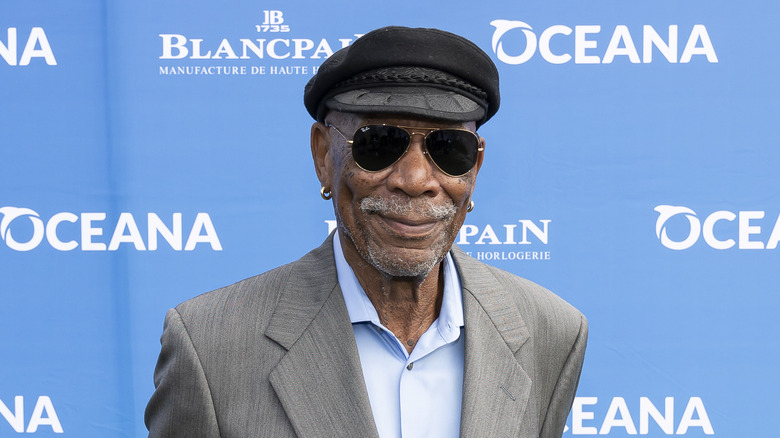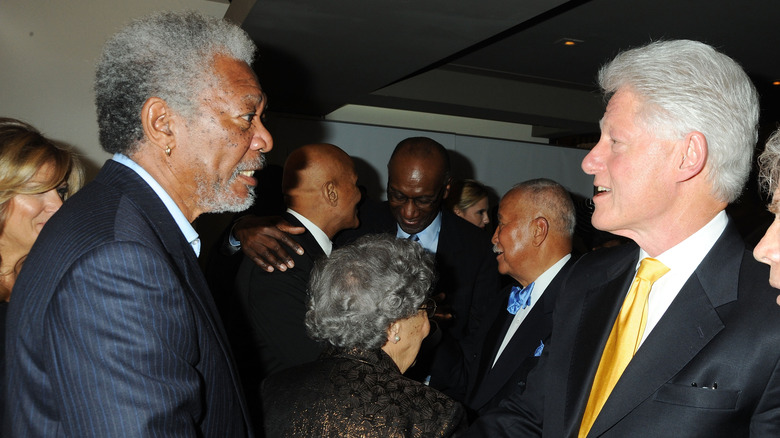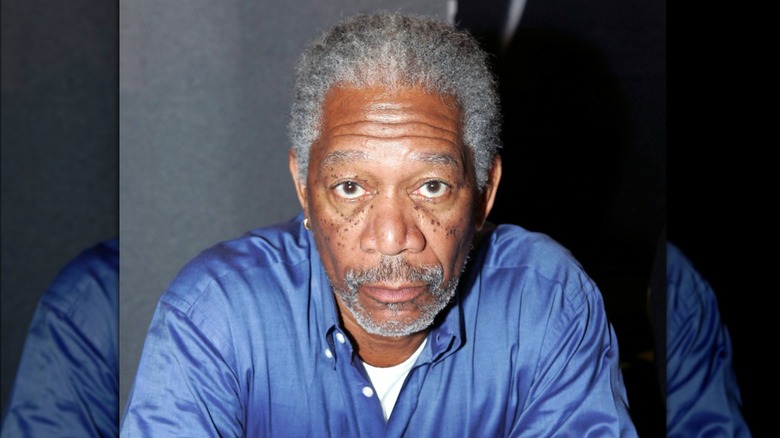What We Know About Morgan Freeman's Political Views
Morgan Freeman's velvet voice lives rent-free in so many hearts and minds around the world. Known for his roles in nearly 150 films over a career that spans decades, including his Oscar-award-winning portrayal of Eddie "Scrap-Iron" Dupris in "Million Dollar Baby," Freeman is a Hollywood icon. Despite his celeb status with dozens upon dozens of award nominations, he even has his underrated movies. In Freeman's estimation, the most underrated one in his career was the 2012 "The Magic of Belle Isle" (via Far Out Magazine).
While his fame has garnered him quite a bit of attention in his over half-century of acting, Freeman is not immune from political rigmarole. That was made clear when Freeman was photographed with Mississippi gubernatorial candidate Brandon Presley and his wife, Katelyn Mabus, in October 2023. Freeman is from and lives in Mississippi, yet Mississippi Governor Tate Reeves saw the photo of the trio and dubbed Freeman a "Hollywood liberal" (per Newsweek). Reeves' attack was met with contempt from tens of thousands online who pointed out Freeman's status as a Mississippian.
Even if things appeared to shake out in his favor, the social media snafu got people wondering about Freeman's political affiliations. Unlike many of his Tinseltown peers, Freeman is not as openly political online. With that in mind, where do his loyalties lie?
Freeman voted for Hillary
Although there have been celebs in the White House, Morgan Freeman is more the type to play the President of the United States on the silver screen (which he's done twice). Still, he isn't afraid to own up to his voting record in public. He said he voted for Hillary Clinton in 2016, decrying the politics of Donald J. Trump. Following the 2016 election, Freeman told AARP Magazine (via The Daily Mail), "It feels like we are jumping off a cliff." Even though he was disappointed in the election outcome, he also voiced hope that Trump would be a sound president. "I'm holding out hope that Donald Trump has to be a good president," Freeman added. "He can't not be. What I see is a guy who will not lose."
As for the division that occurred following the 2016 election, Freeman said in the summer of 2017 that the divide was caused by disillusionment. He noted (per The Wrap) that fear created by that disillusionment further divided the divided United States along political lines. It makes sense that his six-part National Geographic series "The Story of Us With Morgan Freeman" came about after the Trump presidency. The series had Freeman traveling the world and talking to people about their lives, the point of which was to show us what we all have in common.
He wants race monikers removed from cultural language
As he nears 90 years old, Morgan Freeman doesn't give a lot of interviews anymore. So when he does, it's a big deal. In an April edition of The Times UK Freeman gave an interview in which he described his dislike for terms like "African American," as well as the concept of Black History Month. Although not as directly related to his political views as his voting record, Freeman's delineation in racial rhetoric is indicative of his political stances.
"Two things I can say publicly that I do not like," he told The Times. "Black History Month is an insult. You're going to relegate my history to a month? Also 'African-American' is an insult. I don't subscribe to that title. Black people have had different titles all the way back to the n-word and I do not know how these things get such a grip, but everyone uses 'African-American'. What does it really mean? Most black people in this part of the world are mongrels. And you say Africa as if it's a country when it's a continent, like Europe." Despite his dislike of these terms, Freeman also acknowledged in that interview a huge dynamic change in the film industry.
Since his earlier days in movies like "Driving Miss Daisy," Freeman told The Times there's been a clear move towards a more inclusive industry. He noted that so many more kinds of people are represented in films, including LGBTQIA+ and interracial couples.



